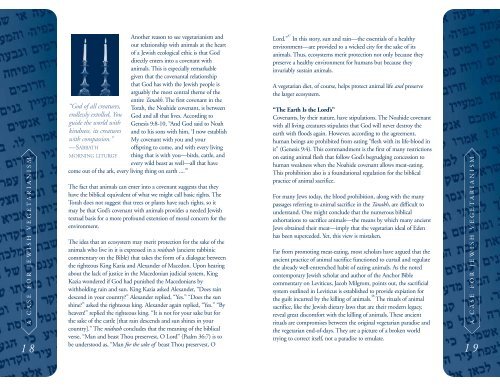JEWISH
A Case for Jewish Vegetarianism - All Creatures
A Case for Jewish Vegetarianism - All Creatures
- No tags were found...
You also want an ePaper? Increase the reach of your titles
YUMPU automatically turns print PDFs into web optimized ePapers that Google loves.
A CASE FOR <strong>JEWISH</strong> VEGETARIANISM<br />
18<br />
“God of all creatures,<br />
endlessly extolled, You<br />
guide the world with<br />
kindness, its creatures<br />
with compassion.”<br />
—SABBATH<br />
MORNING LITURGY<br />
Another reason to see vegetarianism and<br />
our relationship with animals at the heart<br />
of a Jewish ecological ethic is that God<br />
directly enters into a covenant with<br />
animals. This is especially remarkable<br />
given that the covenantal relationship<br />
that God has with the Jewish people is<br />
arguably the most central theme of the<br />
entire Tanakh. The first covenant in the<br />
Torah, the Noahide covenant, is between<br />
God and all that lives. According to<br />
Genesis 9:8-10, “And God said to Noah<br />
and to his sons with him, ‘I now establish<br />
My covenant with you and your<br />
offspring to come, and with every living<br />
thing that is with you—birds, cattle, and<br />
every wild beast as well—all that have<br />
come out of the ark, every living thing on earth ....’”<br />
The fact that animals can enter into a covenant suggests that they<br />
have the biblical equivalent of what we might call basic rights. The<br />
Torah does not suggest that trees or plants have such rights, so it<br />
may be that God’s covenant with animals provides a needed Jewish<br />
textual basis for a more profound extension of moral concern for the<br />
environment.<br />
The idea that an ecosystem may merit protection for the sake of the<br />
animals who live in it is expressed in a midrash (ancient rabbinic<br />
commentary on the Bible) that takes the form of a dialogue between<br />
the righteous King Kazia and Alexander of Macedon. Upon hearing<br />
about the lack of justice in the Macedonian judicial system, King<br />
Kazia wondered if God had punished the Macedonians by<br />
withholding rain and sun. King Kazia asked Alexander, “Does rain<br />
descend in your country?” Alexander replied, “Yes.” “Does the sun<br />
shine?” asked the righteous king. Alexander again replied, “Yes.” “By<br />
heaven!” replied the righteous king. “It is not for your sake but for<br />
the sake of the cattle [that rain descends and sun shines in your<br />
country].” The midrash concludes that the meaning of the biblical<br />
verse, “Man and beast Thou preservest, O Lord” (Psalm 36:7) is to<br />
be understood as, “Man for the sake of beast Thou preservest, O<br />
Lord.” 47 In this story, sun and rain—the essentials of a healthy<br />
environment—are provided to a wicked city for the sake of its<br />
animals. Thus, ecosystems merit protection not only because they<br />
preserve a healthy environment for humans but because they<br />
invariably sustain animals.<br />
A vegetarian diet, of course, helps protect animal life and preserve<br />
the larger ecosystem.<br />
“The Earth Is the Lord’s”<br />
Covenants, by their nature, have stipulations. The Noahide covenant<br />
with all living creatures stipulates that God will never destroy the<br />
earth with floods again. However, according to the agreement,<br />
human beings are prohibited from eating “flesh with its life-blood in<br />
it” (Genesis 9:4). This commandment is the first of many restrictions<br />
on eating animal flesh that follow God’s begrudging concession to<br />
human weakness when the Noahide covenant allows meat-eating.<br />
This prohibition also is a foundational regulation for the biblical<br />
practice of animal sacrifice.<br />
For many Jews today, the blood prohibition, along with the many<br />
passages referring to animal sacrifice in the Tanakh, are difficult to<br />
understand. One might conclude that the numerous biblical<br />
exhortations to sacrifice animals—the means by which many ancient<br />
Jews obtained their meat—imply that the vegetarian ideal of Eden<br />
has been superceded. Yet, this view is mistaken.<br />
Far from promoting meat-eating, most scholars have argued that the<br />
ancient practice of animal sacrifice functioned to curtail and regulate<br />
the already well-entrenched habit of eating animals. As the noted<br />
contemporary Jewish scholar and author of the Anchor Bible<br />
commentary on Leviticus, Jacob Milgrom, points out, the sacrificial<br />
system outlined in Leviticus is established to provide expiation for<br />
the guilt incurred by the killing of animals. 48 The rituals of animal<br />
sacrifice, like the Jewish dietary laws that are their modern legacy,<br />
reveal great discomfort with the killing of animals. These ancient<br />
rituals are compromises between the original vegetarian paradise and<br />
the vegetarian end-of-days. They are a picture of a broken world<br />
trying to correct itself, not a paradise to emulate.<br />
A CASE FOR <strong>JEWISH</strong> VEGETARIANISM<br />
19


